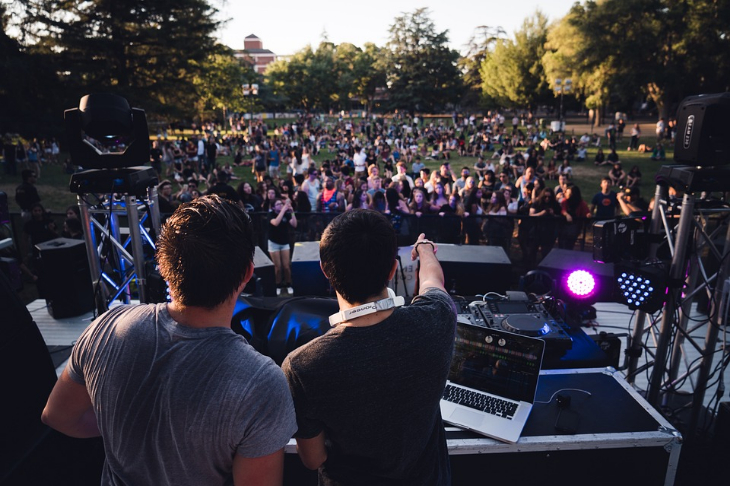When and Why Should You Hire an Entertainment Attorney
One of the most important decisions you will make in your musical career

Gateway Blog category interest
One of the most important things to remember about your band or your musical project is that, whether you intend it to be or not, it is a business. The minute you write your first lyrics, pen your first original tune, name your project, band or brand, or engage with other members you have performed an act that has the potential to be legally affected. In these days of hyper-litigation, where you can, and at some point probably will, be sued for just about anything or find yourself in the position of needing to seek legal remedies for transgressions against you, it is more important than ever to consult with an entertainment attorney on any potentially legally binding agreement you may find yourself in. In short, the minute you are handed any sort of contract, proposal or agreement that could have any sort of legal impact on your career, your copyrights, your songs, your livelihood or your music, you should contact an entertainment attorney.
First of all, let me be clear here. Not just any attorney will do. Your brother-in-law who works as a tax attorney, your neighbor who represents criminals, or that guy on television who talks about how he can can put millions in your pocket if you were in a car accident, none of those guys will do. Sure, they may be great at representing their clients and could even be some of the most honorable people you know, but they won't know the first thing about the ins and outs of a recording contract, a copyright claim, intellectual property rights or any of the multitude of issues you could face as a recording and/or touring artist.
Situations that could require consulting an entertainment attorney could begin with the formation of your band and the assignment of roles within your band. As I mentioned above, your band is a business which needs legal protections. Are you going to set yourself up as a corporation, a sole proprietorship or a partnership? Who will be responsible for what? How will you divide the proceeds from your recordings, your merchandise, your touring, your publishing? If you are an artist and are presented with any sort of agreement that could affect your band or musical project in any way, be it a management agreement, recording contract, publishing deal, distribution deal, sync licensing agreement, administration agreement, co-publishing agreement, endorsement or sponsorship agreement, production agreement, development deal, merchandise deal or co-write agreement, you should consider contacting an entertainment attorney.
For more information on Entertainment Attorneys and when you should hire one, check out our interview with Entertainment Attorney and Author, Kamal Moo here.
Something else to consider when thinking about hiring an entertainment lawyer is that they are also really good to work with when it comes to finding a record deal, a good manager, an agent or other key team members. They will often utilize their connections and relationships to assist you in building your team and helping to procure deals that are beneficial to your career as an artist. They facilitate relationships with producers and record labels and assist in the negotiation of contracts. It's important that you have a strong, aggressive attorney, willing and able to fight for your interests. To be clear though, not all entertainment attorneys are what we refer to as "shopping attorneys", those who specialize in finding and negotiating record deals. Some are transactional specialists who only draft and negotiate contracts, while others are litigation specialists who spend a lot of time in courtrooms. The entertainment attorney that is right for you depends specifically on your needs and where you are in your musical career path.
So how can you find an entertainment attorney that's right for you?
A good place to start would be right here. We have published the largest collection of entertainment attorney contacts anywhere, broken down by city/state, specialty and the genres they typically work with. The directory is updated weekly and available for only $9.99. If that doesn't work for you, you can simply run a Google search for entertainment attorney and find hundreds, though Google has virtually no vetting process when it comes to their search results, meaning you literally could end up as they say "getting what you pay for". Trying to save a few bucks on the front end could end up costing you thousands on the back.
So now you have a few contacts for entertainment attorneys and it's time to find the one that best fits your needs. What are the questions you should be asking?
Well, once you have secured a meeting with an entertainment attorney willing to consider taking you on as a client, it's important that you be as detailed as possible in getting information on their services, their fees and their abilities. Who have they represented? How much experience do they have in cases like yours? How do they feel about their chances of success with your particular situation? What is their typical fee structure? Its important that they have extensive experience in the music industry as the contracts and issues that we run into in this business are unique to this industry and come with their own unique set of problems, problems that only a good entertainment attorney will know how to deal with. Considering that this industry is literally changing by the day, with all of the new challenges related to streaming, intellectual property rights, copyright, royalty divisions, and the way that politics are beginning to play a much larger role in our industry, it's imperative that you find an entertainment attorney that is not only seasoned but ready and able to deal with the new challenges posed by the new music industry.
How are entertainment attorneys typically paid?
Obviously this can vary from attorney to attorney. Many entertainment attorneys will work on a 5% to 7% commission on the deals they negotiate for their clients though, in many cases, especially if they aren't one hundred percent confident in the outcome, or upside, of the agreement, they will require a retainer, or upfront amount, against which those commissions will be taken. These retainers will typically contain language regarding billable hours as deals fall through all the time and they can't be expected to work for free. While some entertainment attorneys will work on the above described contingency, many entertainment attorneys charge hourly or flat rates which can vary wildly from attorney to attorney. Entertainment attorneys don't come cheap, but the right advice could save you a lot more than you will end up paying them in fees.
In a nutshell, it's important for you to hire an entertainment attorney whenever you find yourself looking at any document or situation that could affect your band, brand or career in any way, legally.
More Photos
More from Gateway Blog

Gateway Blog
Music Biz Basics
A 101 Type Guide to the Basics of the Music Business with Music Business Attorney Kamal Moo

Gateway Blog
Music Business Conferences in 2021 You Should Know About
Check out a mixture of live and virtual music industry conferences this year.


Gateway Blog
Eventbrite Unveils 2020 "Inside Look Report,"
A Comprehensive Study on Human Connection Amidst a World of Online Experiences

Gateway Blog
A Discussion with Music Attorney Kamal Moo
An interview every new band or musician should read

Gateway Blog
When and why does your band need a manager?
How and when to choose the most important member of your team





 Newsletter Signup
Newsletter Signup